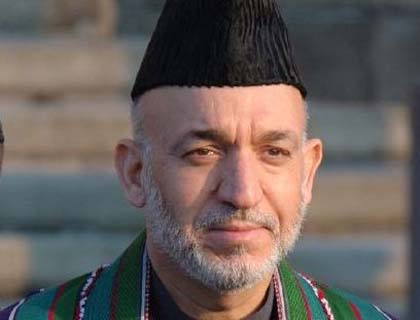ISLAMABAD - With prospects for peace talks at a new low, the Afghan government is attempting to resuscitate negotiations with a seemingly contradictory approach: publicly bashing the Pakistanis for supporting the Taliban while at the same time asking for their help, Washington Post (WP) reported on Sunday.
In a series of recent speeches and interviews, President Hamid Karzai has sought to balance inflammatory remarks that Pakistan is fighting a proxy war in Afghanistan with conciliatory appeals for greater cooperation among neighbors.
Last week, for example, Karzai signed a strategic partnership agreement with India, Pakistan's arch-rival, but on the same trip he called Pakistan a "twin brother" and the key to long-term peace. After years of failed efforts to talk directly with the Taliban, Karzai has decided he must talk through Pakistan to make progress.
"When President Karzai says we want to talk to Pakistan, it doesn't mean we are at war with Pakistan," Mohammed Umer Daudzai, Afghanistan's ambassador to Pakistan, said in an interview. "It means all the other contacts didn't work. We want to go through Pakistan for any dialogue with the Taliban."
Afghanistan's new position in some ways mirrors the Obama administration's own dilemma with Pakistan. Many U.S. officials are convinced that Pakistan's intelligence agency is helping insurgents fight in Afghanistan, but the Americans want to avoid ruining what cooperation remains.
But Pakistan's firm denials that it is supporting the Taliban and its anger at the Afghan and U.S. accusations suggest it might have little inclination to change course.
Karzai has been vague about how he wants to engage with Pakistan to further peace talks. Afghan officials said the first step is to convene a meeting of a joint peace commission, established in June, that includes Pakistani Prime Minister Yousuf Raza Gilani and the heads of the army and intelligence services, and their Afghan counterparts.
U.S. officials support Karzai's call for engaging the Taliban through Pakistani government officials. Their own efforts to meet with insurgents have at times mirrored the Afghan approach - a reported meeting between U.S. officials and representatives of the Taliban-affiliated Haqqani insurgent network was brokered by Pakistani intelligence.
Instead of dealing with "shadow intermediaries," Karzai wants to pursue reconciliation "in a way that's more focused with established interlocutors, which the government of Pakistan would be one. We welcome that," said a senior U.S. official in Afghanistan, speaking on the condition of anonymity in keeping with diplomatic protocol.
But Pakistan is angry that it has been made the world's scapegoat for the decade-long war in Afghanistan. Pakistani officials have said that they would help with negotiations but that the United States must decide whether
it wants to continue fighting in Afghanistan or make peace. Karzai's new stance has been months in the making. With the killings this summer of his half brother, Ahmed Wali Karzai, who carried out the president's agenda in Kandahar, and another top ally, former governor Jan Mohammad Khan, the president's influence over his base in southern Afghanistan was dealt a powerful blow.
Karzai has become more vulnerable to criticism from his rivals from the north, primarily the ethnic Tajiks, who disagree with what they consider his policy of "appeasement" by inviting the Taliban to talk peace. But at a meeting in Kabul after Rabbani's death, Vice President Mohammed
Fahim, Interior Minister Bismillah Khan Mohammadi and other leaders discussed how negotiating with the Taliban had failed and that Pakistani intelligence was behind this killing, one participant said.
Some at the meeting thought that "as long as Karzai is in this country, there is no hope," a participant said. An aide to Fahim confirmed that the meeting took place but denied that the criticism of Karzai was so stark.
Parliament member Yonus Qanooni said in an interview that blaming Pakistan was a "positive step" but that Karzai's decision to keep pursuing negotiations was "a huge mistake."
Pressure was also growing on Karzai among his supporters. In early August, a delegation of southern tribal elders and politicians told Karzai that his "lenient style" toward the Taliban was counterproductive and that "Pakistan was the main player and we have to start talks with them," said Aman Mohammad Hotak, the head of Uruzgan's provincial council. (Agencies)

